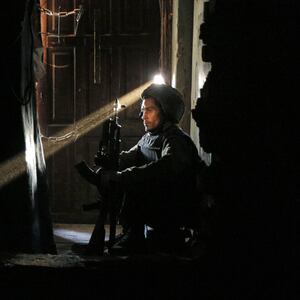KRASNOGORIVKA, Ukraine–The front line is only one kilometer away from the children’s soccer club where five- and six-year-old boys were exercising on Monday morning. And the children’s music school is even closer, 800 meters, which is to say half a mile. All the windows are covered, since shock waves from explosions have broken them so many times.
Machine guns and artillery could be clearly heard while 6-year-old Daria Pamazanova, in a funny hat with teddy-bear ears, was rehearsing at her singing class.
During the break Daria told me about the days and nights she spent in the bomb shelter, emphasizing the “bomb” syllable: “When the shooting was especially bad, I came down into the bomb shelter in our garage with my favorite stuffed bear. We have fruit and other food in there. When the firing stopped my father and brother brought over blankets and pillows, and everything from the fridge from the house.” At this point Daria’s singing teacher began to cry.
ADVERTISEMENT
When Daria walks out of the school with her father, she points at a black metal door to the basement: “Here is where the bomb shelter is for the school,” she says with a serious adult expression on her face.
This Ukrainian town has been surviving right on the front lines of Ukraine’s war with Russian-backed separatists in the Donbas region just down the road for more than five years. At least 5,000 people have fled from Krasnogorivka. Many of the IDPs, internally displaced persons, dream of coming back home.
On Monday, this important day when the leaders of Ukraine, Russia, France,, and Germany sat down for talks in Paris, Ukrainians in the war-torn Mariinka region, some of the most affected by the Donbas war, ask for peace.
“We are exhausted, there is nothing more important than to put the full stop and end the fighting, so children and their parents will not be terrified of coming to this school, so these children have a future,” the music school’s director Natalia Gontarenko said, hoping the message might get through to the negotiators.
Meanwhile in Krasnogorivka's 130 children study arts, jazz, classical music, and rock-and-roll here. Life goes on.
A big-eyed boy, Motvey Vitman, born during the first days of the war in Donbas in the spring of 2014, was confidently kicking the ball at the soccer club. During his short life bombs and shells destroyed kindergartens and schools here in his hometown, artillery blasts blew out windows in multiple apartment buildings across the street from where he was now playing soccer. Only one kindergarten is functioning out of the four Krasnogorivkra had before the war. Motvey’s grandmother, Raisa, put him on her bike and looked toward the front: “How sickening, but we’ll bring up great people nevertheless.”
The shelling of the streets stopped nearly three years ago, but the sound of the front continued to be a daily soundtrack. The town’s half-empty rundown buildings don’t have heating. People heat homes with coal and wood, like their grandparents did decades ago.
In the early days of fighting, Andrei Shapochka, the chief manager of 12 electric stations in the Mariinka region, saw a little boy climbing into the destroyed sport complex to play indoor soccer in the freezing gym with no windows. Shapochka, a man of strong spirit and endless optimism, decided to reconstruct the sport complex for children.
These days about 100 of Krasnogorivka’s children of all ages play sports at his freshly reconstructed facility. Shakhter, Ukraine’s famous soccer team, donated three million Hryvnia ($127,000) to fix the gym.
“I don’t care who takes control of the separatist part of Donbas, China or Russia, all we want from today’s Paris meeting is for them to stop killing people,” Shapochka said. He remembered his close friend and neighbor dying in his arms from 21 shrapnel wounds when he did not make it to the bomb shelter. “But the war is a source of big money for people in the region, so our hopes that President Volodymyr Zelensky could manage to stop the war are tiny.”
Just eight kilometers away from Krasnogorivka civilians of the town of Mariinka continue to suffer from violence. In late November a young woman was shot in the shoulder as she was pushing a carriage with her 18-month=old toddler. Several buildings have burned.
The daily news of the ongoing war traumatizes the population. The disillusionment with politicians has increased dramatically in Donbas in the last two years.
Two assistants in a small candy shop on Druzhba Street discussed the latest shooting and the Paris peace talks on Monday afternoon. Irina Cherniavskaya, 57, broke down in tears. “My life has passed by! I thought when my kids grow up I will spend a bit of time for myself and that’s when the war started. I had to abandon my home and run. Nobody will give me these five years back," she said through sobs. “My 8-year-old niece died of cancer, if not for the war, she might have lived .”
People in the streets of Krasnogorivka greeted Shapochka warmly. He is well known for helping people in need. The idea of opening up a kids soccer club just one kilometer away from the front lines might sound insane for an outsider but not for people of Krasnogorivka, where nobody pays attention to artillery blasts. “These shots are at the testing field and this blast is outgoing,” explains Vadim, a gloomy grandfather of one of the little boys.
We walked along Krasnogorivka’s center. Vadim looked at the factory of his former employer. It looked completely run down, abandoned. He doubted that French President Emmanuel Macron and German Chancellor Angela Merkel cared much about the children here as they sat down for the talks on Monday. “Putin’s and Zelensky’s administrations have already agreed on whatever suits them, and the meeting in Paris is just a formality,” he added without much hope.







